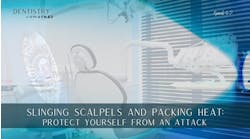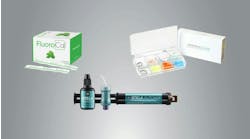Steven Pigliacelli, CDT, MDT
I am sure you belong to a study club, dental club, or organization that sporadically meets and sponsors dental education. A big name speaker who you really want to see is often there. Meetings may be held at a restaurant, hotel, dental office, or even a dental laboratory. Best of all, CE credits are included.
You walk through the doors and enter the room where a few vendors are most likely standing behind tables. You must walk past these vendors in order to enter the lecture. Do you go to the booths and say hello? Do you look at what is being offered? Do you acknowledge them in any way for contributing money to pay for the speaker? Or do you turn your head and pass them on your way to the lecture? It might be worth your while to consider your relationship with these vendors.
No Such Thing as Free CE
If you've never given much thought to who pays for CE credits and other event expenses, here are some facts to consider. Such events can cost between $2,000 and $18,000 depending on the speaker and venue. Even if the venue is someone's office, they're usually paying office staff for their time, as well as for someone to clean up afterward. The food is no different than any other catered affair with a per head minimum. Each vendor contributes various amounts to help cover the cost; usually there is one main sponsor, such as a neighborhood implant company, who pays the most.
MORE FROM THIS AUTHOR | The true cost of doing it for yourself
You don't have to embrace the sponsor or promise to buy all their materials. But this is a good time to carefully consider how such events are put together, and what they mean to you and your practice, because CE credit meetings are about to take a dramatic turn.
Due to the Sunshine Act and stricter ADA guidelines, free CE courses endorsing a particular product will cease to exist. The days of infomercials are over. Future seminars and meetings will need to be truly educational. This will definitely be a good thing for education standards, but it will also likely mean fewer events to attend.
Furthermore, many implant manufacturers have either merged or been bought out by larger financial corporations. This translates to two possible scenarios. The first is that the new corporate owners may be more prudent with cash because they must abide by a bottom line. Donations of $75,000 and up will be less desirable to a board of directors seeking to increase profits and decrease expenses. The other scenario is that more mergers mean fewer companies. While in the past a meeting may have had 10 implant vendors, soon a meeting may have only six, with the larger companies reducing their available donations that other companies will not be required to match.
Change for the Better
Less vendor support and tighter restrictions on CE credits will ultimately result in higher admission fees to meetings and study clubs, and speakers will have to reduce their fees as well. There is another possible benefit to these changes, however - a rejuvenation of dental societies.
MORE FROM THIS AUTHOR | Not your father's nonprecious
The last few years have seen a decline in membership. One reason has been so many free CE credits; the other has been too much old cronyism. As financing CE becomes more difficult, these established societies can be revived to appeal to younger, more interactive groups. Universities are already teaching establishments where meetings are frequently welcomed. Traditional small study clubs, where a regional speaker donates time to a small group of dentists, can be both affordable and desirable because this format endorses interaction and discussion.
In the long run, with the elimination of the infomercial course, actual useful educational material can be expressed. The corporate speaker showing corporate slides will be a thing of the past, and I guarantee any dentist would agree this is a welcome change. Moreover, social meetings that are disguised as clubs and lack any educational value will be eliminated.
The truth remains, however, that someone still needs to pay for these meetings. Perhaps more small generic vendors paying modest amounts rather than one large corporate vendor will be required to offset costs, resulting in more booths. So when you go to these meetings with many booths, I do hope you thank each and every representative for their contribution to the day's event. Your appreciation can help make their investment in your continuing education worth their while.
Steven Pigliacelli, CDT, MDT, is a faculty instructor in postgraduate prosthodontics at New York University. He manages Marotta Dental Studio and directs the GPR and Prosthetic Resident Rotation there, an intensive educational program that focuses on the value of the technician/dentist relationship. He has published in dental journals, and he lectures and performs hands-on demonstrations at study clubs and seminars.





